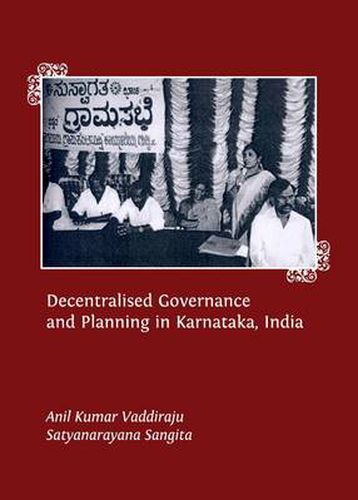Readings Newsletter
Become a Readings Member to make your shopping experience even easier.
Sign in or sign up for free!
You’re not far away from qualifying for FREE standard shipping within Australia
You’ve qualified for FREE standard shipping within Australia
The cart is loading…






The Indian Constitution provides local institutions with the status of local self-governments. The Constitutional status means that the local governments are on par with the Central and State governments. In that status they can plan for their economic and human development. This fact, however, is undermined in practice at the state/province level. The provision provided in the 74th Amendment Act of the Constitution for creating and activating District Planning Committees (DPCs) is the responsibility of the state governments. This often is also in contradiction with the interests of the realpolitik of the state level. Often DPCs are not constituted, and if constituted, they are dysfunctional. The creation of the institutions for local level independent planning and budgeting itself is a political process. This is the story not only in the backward states of India but also in states such as Karnataka that have historically been more progressive than other states with respect to local self-government.This book is a study of the Tumkur district in rural Karnataka. Karnataka is traditionally known as a state which championed the decentralisation process. The state is also known for the ‘Karnataka Model’ of development, wherein rural decentralisation combined with the advanced information and biotechnology led economic development process is supposed to constitute such a model. In that context this book examines the devolution process to local governments, the process of the integration of plans-rural with urban plans and different sectors with each other-and the implementation of district level plans. The book is a product of primary research in Karnataka, India and brings to light various aspects of decentralised planning in Karnataka that are instructive for the other Indian states as well as many developing countries where currently decentralised planning is implemented.
$9.00 standard shipping within Australia
FREE standard shipping within Australia for orders over $100.00
Express & International shipping calculated at checkout
The Indian Constitution provides local institutions with the status of local self-governments. The Constitutional status means that the local governments are on par with the Central and State governments. In that status they can plan for their economic and human development. This fact, however, is undermined in practice at the state/province level. The provision provided in the 74th Amendment Act of the Constitution for creating and activating District Planning Committees (DPCs) is the responsibility of the state governments. This often is also in contradiction with the interests of the realpolitik of the state level. Often DPCs are not constituted, and if constituted, they are dysfunctional. The creation of the institutions for local level independent planning and budgeting itself is a political process. This is the story not only in the backward states of India but also in states such as Karnataka that have historically been more progressive than other states with respect to local self-government.This book is a study of the Tumkur district in rural Karnataka. Karnataka is traditionally known as a state which championed the decentralisation process. The state is also known for the ‘Karnataka Model’ of development, wherein rural decentralisation combined with the advanced information and biotechnology led economic development process is supposed to constitute such a model. In that context this book examines the devolution process to local governments, the process of the integration of plans-rural with urban plans and different sectors with each other-and the implementation of district level plans. The book is a product of primary research in Karnataka, India and brings to light various aspects of decentralised planning in Karnataka that are instructive for the other Indian states as well as many developing countries where currently decentralised planning is implemented.